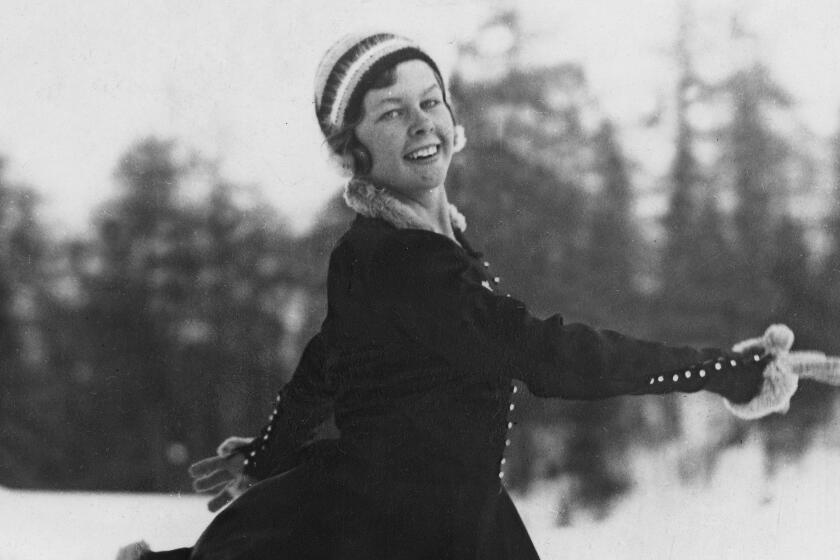Young U.S. Sprinters Quick to Fill Demand
Maurice Greene, a three-time world champion at 100 meters, reacts strongly when the topic of conversation is today’s new breed of American sprinters.
“There’s always competition and you’re always going to get someone new trying to step up,” said Greene, who will compete in the 100 at the USA Track and Field Championships, which begin today and run through Sunday at the Home Depot Center.
“But that’s what competition is all about.... You just have to be prepared for whatever comes before you. The game is still the same, just with different faces.”
Greene, who turns 31 next month, isn’t ready to concede to a changing of the guard among U.S. sprinters, but there are plenty of indications that the process has already begun.
Leading the resurgence are two 2004 Olympic champions -- Justin Gatlin, 23, who won gold in the 100 meters, and Shawn Crawford, 27, winner in the 200. Both will compete this weekend, but even they are not locks to make the U.S. team that will compete at the World Championships at Helsinki in August.
That’s because there are plenty of even lesser-name athletes who are pushing them. Eleven Americans have run 10.13 seconds or better in the 100 this year -- among them, five who do not have bios on the USA Track and Field website. And it’s the same in the 200, with 13 runners recording times of 20.44 or better, including five without bios on the sport’s national website.
“Every so often you have a year or a time period where phenomenal athletes appear in every sport,” said Mike Conley, a USA Track and Field director. “Right now, it’s our time.”
And just in the nick of time, because recently the sport’s image had been impugned by several notable allegations involving performance-enhancing drugs.
Tim Montgomery, the world-record holder in the 100 until Jamaican Asafa Powell ran faster two weeks ago, is awaiting a decision from the Court of Arbitration for Sport on his appeal of a proposed lifetime ban.
Then there are quarter-milers Jerome Young and the Harrison twins, Calvin and Alvin, who will not compete this weekend because they are serving drug suspensions. Young was banned for life last year; Calvin Harrison was given a two-year suspension and Alvin Harrison was banned for four years.
But where they faltered, up-and-comers have stepped up to more than fill the void.
“We’ve just had, in some views, the greatest NCAAs ever in terms of performances, in terms of great athletes demonstrating their abilities under tremendous pressure,” said Craig Masback, executive director of USA Track and Field.
“It’s a clear continuation of a theme that began at last year’s Olympic trials, where the athletes really took over the attention from other off-track stories. They went to Athens and surprised the world with the success that they had.”
Wallace Spearmon, a 20-year old Arkansas sophomore who recorded the world’s fastest time in the 200 this year when he won the NCAA title at 19.91, said young athletes were turning to track and responding to the challenge.
“I played all of the other sports growing up, and track was my last option,” said Spearmon, whose father, Wallace Sr., was a two-time All-American sprinter at Arkansas in the mid-1980s.
“Track kind of chose me. But in the level of competition, when someone steps up and starts it, everyone chases. With everyone being young, we all want to be on top and no one sees why they can’t be that person. People are running as fast as they need to and not knowing what they’re doing, has made it extremely special.”
Among the sprinters joining Spearmon in the youth sprint movement are 19-year-olds Walter Dix, a freshman at Florida State who has run 10.06 in the 100 and won the event at the NCAA championships, and Xavier Carter, a Louisiana State freshman who has the world’s fourth-best mark in the 200 at 20.02.
John Smith, who will coach the USA men’s team at Helsinki, says that he’s excited to see so many top-notch sprinters competing at such a high level but warns not to get caught up with their fast marks.
“Times are great, but I’m more interested in seeing these young guys compete,” said Smith, two-time U.S. outdoor 400 champion and 1972 Olympian. “Times are real good indicators that people have potential, but they need to improve upon them and perform in big races. You can’t get stuck just on times.”
Smith said that although young sensations usually get the headlines, it’s the runners who’ve been around for a while that normally replace aging stars.
“Sometimes, guys just develop later,” Smith said. “Justin Gatlin was on the scene for a while and Shawn Crawford is really in Maurice’s era. People love to look at the young ones, but I like to look at people in the middle. There are the runners that I want to see as far as the next one. It’s not always the superstars you see or read about.”
One runner who fits the bill is Leonard Scott, who has emerged as a contender in the 100 this season after a brief career in the NFL.
Scott, 25, is a former national junior sprint champion who competed in football and track at Tennessee. After getting cut by the Pittsburgh Steelers last year, Scott moved to Los Angeles to be coached by Smith and train with Greene, and in his first full season concentrating solely on running, he has recorded several top times, including a wind-aided mark of 9.94.
According to Smith, Scott’s only one example of the nation’s diverse sprint talent pool.
“America is so rich in talent, it’s just a matter of us getting to the track and not being distracted,” Smith said. “It’s about getting down there and when the gun goes off, running down the track as fast as they can.”
Something Greene is ready to prove that he can still do well. With a resume that includes an Olympic gold medal and three world championship titles in the 100, Greene wants to prove that he’s not over the hill.
“I know that I haven’t run as fast as I can,” said Greene, who ran 9.87 earlier this month and also still talks a good game.
“All I know is that those young guys would be better off kissing me on the cheek at the starting line than talking junk to me because the beatings are much worse when they do that.”
More to Read
Go beyond the scoreboard
Get the latest on L.A.'s teams in the daily Sports Report newsletter.
You may occasionally receive promotional content from the Los Angeles Times.





